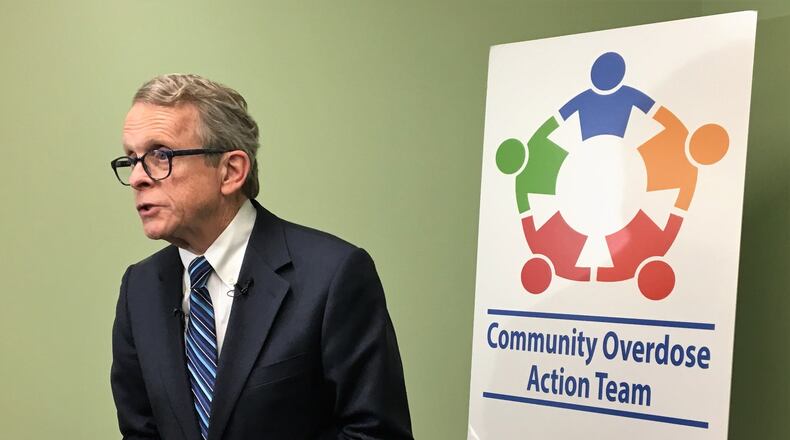Leaders of the COAT, which consists of more than 100 partners including county and city officials, health agencies, law enforcement leaders, schools and non-profits, shared highlights of what has been done locally to reduce the number of fatal drug overdoses in the county from 566 in 2017 to 294 in 2018.
RELATED: Local overdose crisis response earns county national award
“It’s through the work of every single person in this room,” said Health Commissioner Jeffrey Cooper.
Local officials shared information on what the county is doing to prevent and treat addiction, including how various agencies are sharing data; a new school mental-health screening program; the integration of peer supporters into the jail; and various workforce training programs.
When DeWine heard new ideas, he asked follow-up questions about how specific programs work.
Some in attendance also expressed what they see as ongoing challenges in the community, including a need for those in the medical profession to be better educated on the disease of addiction; more resources for schools to deal with the onslaught of students experiencing trauma; and better access to Medicaid and prescription databases to spot trends.
The Path Forward: Addiction in Dayton
- » Millions of tax dollars pay for new drug treatment -- is it working?
- » Program examines if fentanyl test strips reduce overdoses, save lives
- » Dayton getting national credit for battling opioid crisis
- » Vets twice as likely to fatally OD -- what the Dayton VA is doing about it
- » ‘Life Changing Food’: This eatery hires only people recovering from addiction
- » New challenge for recovering addicts: Finding a job
- » Can Dayton go from 'overdose capital' to a model for recovery?
- » Mother of 7 rebuilding family after addiction
- » A day with Dayton's overdose response team
Dayton Police Chief Richard Biehl raised the issue of increased methamphetamine use in the region, noting that several recent police standoffs and a police-involved shooting involved people on meth. DeWine acknowledged that efforts need to be forward-looking.
“This is going to evolve,” he said, noting the state also has a mental-health crisis that goes hand-in-hand with addiction in many cases.
Once he completes his listening tour, DeWine said, he will present a package to the state legislature representing his plan for dealing with the addiction crisis. It will include the best ideas he’s heard from various communities and respond to the needs he hears expressed.
“These problems get solved at the local level,” DeWine said, and the package will reflect that.
When asked if it will include more money from the state for local government funds, DeWine said, “That’s probably going to happen.”
Officials thanked DeWine for coming and recognizing the Dayton community as a leader in fighting the opioid epidemic.
“We are not ground zero anymore,” said County Commissioner Deborah Lieberman. “We are starting to be known as a model.”
About the Author
